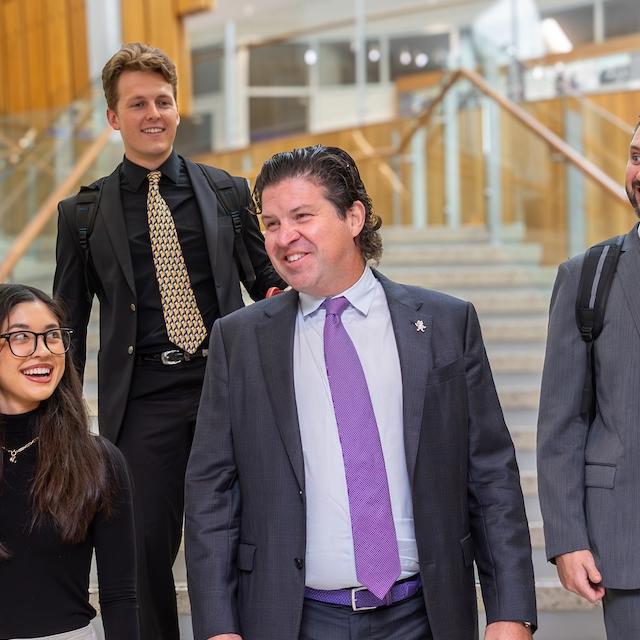
A Candid Conversation with TCU’s 11th Chancellor
In advance of his Nov. 6 inauguration, Texas Christian University Chancellor Daniel W. Pullin sat down with TCU News to talk about how he balances raising four teenagers and his role at TCU, the real story of Guinness and his favorite place on campus. Meet the man becoming the 11th chancellor of TCU.
You have four teenagers running around Minor House. How do you balance being the chancellor
and a dad?
I would not say balance. I would say integrate. Whether it is going to a concert on
campus or football Saturdays, we try to integrate them into what we do. With my wife
and I having careers like we do, there’s a lot of travel involved and a lot of opportunities,
obligations and responsibilities. So, we must ensure that we don’t become consumed
by it day after day, without carving out time to give our most valuable assets, our
children, every opportunity to flourish and become the leaders we hope they will be.
When you do have time … are you a better skier or a better tennis player?
I would say probably a better tennis player. I started skiing later in life. I am
not an expert, but I played tennis competitively through high school and still participate
in a variety of adult leagues and social opportunities. It’s a great way to connect
with people and to relax and get a little bit of a good workout, really at any age.
It’s been a big part of my life and will continue to be.
So you had a lot of influence on the TCU’s men’s tennis team that won the National
Championship, right? They learned all their skills from you?
I’m very, very proud of the national success our program has had with three rings
in the last four years. I have gotten to know Coach David Roditi quite well and actually
played a little bit of tennis with him and some of the student-athletes. They’re very
kind to play down to my level, but I always try my hardest, and it’s also good fun.
We’ve heard a story that you were Homecoming King at the University of Oklahoma —
or was it Mr. Sooner?
Both.
Wait, you were a double award winner?
Oklahoma has a Homecoming King, and there’s another award called the Big Man on Campus.
And yes, I was honored with both of those designations.
The same birdie told us a scepter may have been involved. Can you confirm or deny?
So, yes, at the University of Oklahoma, the Homecoming King is awarded a scepter,
as the queen is awarded a jeweled tiara. Somehow, some way, through all of my various
moves, the scepter has survived. Do you want to see it?
(Editor’s note: Chancellor Pullin did indeed have the scepter on a shelf.)
You still teach your entrepreneurship class at the Neeley School of Business. If you
were going to start a business right now, what would it be?
There’s tremendous opportunity in technology and artificial intelligence, but I would
probably do something that’s been a big part of TCU’s heritage for a long time: an
energy company. Regardless of the tool or technology that will win the future, it
will be powered by energy. In my opinion, the world needs as much energy as we can
get, and energy has really been the pathway to prosperity. Because of the strength
of our network right here in Fort Worth, many of whom are TCU alumni, anybody looking
to start an energy company would have the chance to learn from the best of the best.
We’ve talked about your lack of free time, yet you are still an avid reader. What
are you reading right now?
The book I’m reading right now was prompted by TCU’s opportunity to participate in
the Aer Lingus Classic in Dublin next August. It’s called The Search for God and Guinness. It’s a biography about how this very well-known global brand quite literally changed
the world. If you go back into the history of it, it was actually founded in a faith-based
way. The family that launched Guinness actually thought about it as something that
was healthier than hard, filtered alcohol, something that could still be enjoyed and
bring community together, that wasn't wrecking the lives of their fellow citizens.
It’s a great entrepreneurial story. It’s a great faith story. It’s a great Irish story.
What do you see yourself doing 20 years from now?
I always make every career decision based on a metric: Where can I invest the time
and energy I’ve been given to make the most significant impact on as many people as
possible? Today, and for the last seven years, that’s brought me to TCU. And I feel
like TCU, quite distinctively, has a long-standing tradition of continuity amongst
its chancellors. Many people are calling for a change in higher education, but I believe
it’s an institution that society needs. They need to endure and not just be beholden
to the quarter-to-quarter news cycle or the earnings report like a company. The institutions
that can drive lasting change are the ones focused on continuity and making sure that
decisions get made for the ages, and that’s certainly been very, very instrumental
in TCU’s rise in both size and impact these last 152 years. It would be a great honor
in my life if I continue to be the right leader for TCU the next two decades as well.
TCU recently launched a bold Strategic Plan, LEAD ON: Values in Action. Do you have
any personal goals that align with that vision?
It’s a really great question, and I probably haven’t thought about it exactly this
way before. But our four pillars are very connected to the type of person I’ve tried
to become over the course of my life. The notion of Student-Centered Growth means
a lot to me because that’s how I personally fulfill my professional goal: How do I
open up opportunity for as many people as possible to become the leaders we need?
That’s why I started teaching in college almost 20 years ago and why I continue to
enjoy the role I have today.
For the second pillar, Research, Scholarship and Creative Activity, I strongly believe that the power of college education is to help humanity advance and to arm our graduates with the skill set to do that. Our amazing faculty, working arm-in-arm with aspirational students through our teacher-scholar model, allows them to be co-creators of knowledge and to generate insights that our students will then deploy as they build their careers.
And Athletics is such a wonderful component of how TCU has helped build our brand in recent years. We’re positioning TCU to remain distinctive as we build the university of the future. When you have a competitive spirit, the discipline and the grit, just like our student-athletes do, we can achieve even beyond our dreams.
The fourth pillar, Community Engagement, represents everything that I’ve tried to do in my career: bring people together. I think when people own a pathway or a strategic plan or an initiative or a cause together, then they’re going to be more likely to collectively achieve more than any one leader could alone.
You brought up athletics. You started during a crazy time for intercollegiate athletics.
Have we seen the last of the big changes, or are there more surprises on this roller
coaster?
I think that we’re still on a twisting, turning roller coaster, and a lot of people
want to be on that roller coaster. There is a lot of enjoyment and excitement that
comes with that, but it’s anything but certain. Many universities are having to make
tough decisions on where and how they invest in college athletics. I have a personal
passion to make sure universities, including TCU, continue to offer as many sports
as we can, whether it’s the larger sports like football or Olympic sports. The power
of intercollegiate athletics for a student-athlete is the access to the education
and credentials that allow them to lead for decades once their playing days are over.
I would say “buckle up.” We're still on the ride, but we’re going to try to normalize for the right reasons,
which is to create educational opportunities for as many student-athletes as possible.
Kids love to say “touch grass.” Where is your favorite spot on campus to go take it
all in? To go and remember: This is why I’m here?
I like to go to the Van Cliburn Concert Hall at the Megan and Victor Boschini Music
Center. It’s a very serene room. It’s a beautiful room. Because of our student-centered
approach to instruction, we often use that hall not just for large performances but
for individual master classes taught by our great faculty and talented students. Sometimes,
I’ll just sneak into the back of the hall and watch someone learning the ins and outs
at the piano, or the harp, or an interpretive dance, or whatever the opportunity is.
Not only is it a soothing moment — and I’m in a job with some not-soothing moments
— it’s a real reminder of what we do here: Bring teachers and scholars together, faculty
and staff together, and pour into them at the individual level. It’s a hallmark of
what’s made TCU special throughout our history and a core tenet for the years ahead.
So, your favorite question to end your podcast with is: “What is your ‘Only Here’ moment?” Same question for you: What is your “Only Here” moment?
Only here at TCU, have I been able to see a university grow in size while also growing
in connectivity. Every time we grow at TCU, we get a little bit better, and then we
decide to grow a little bit more and we get a little bit better. Growing in size and
quality, while enhancing how special a place feels, it really is only here at TCU
that we get to do that.
